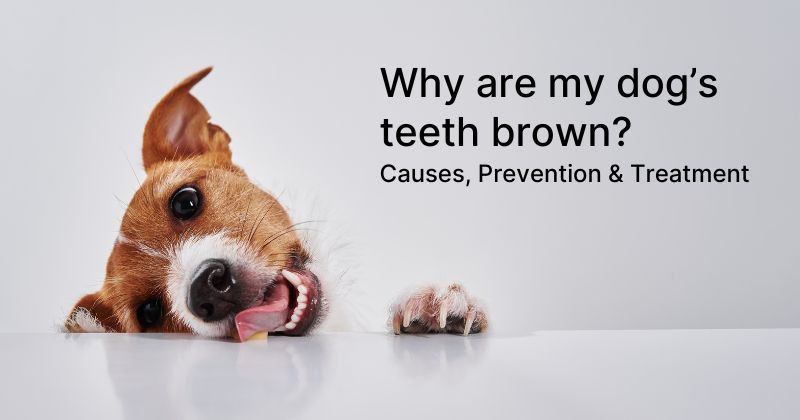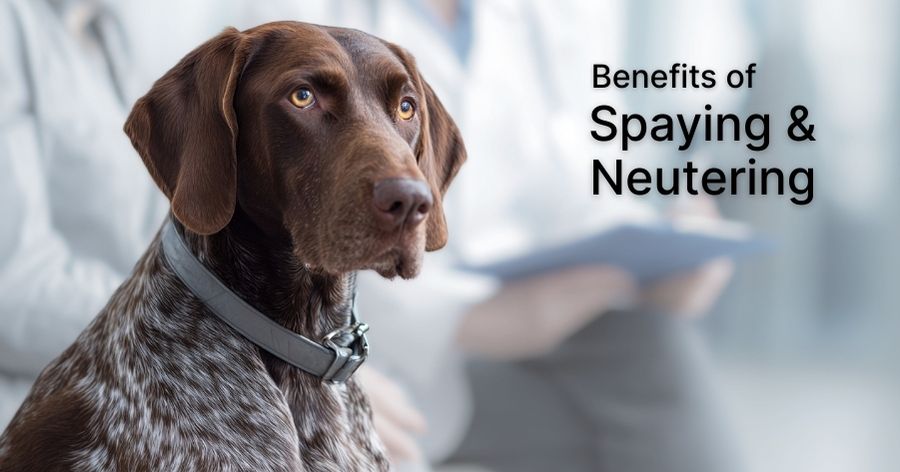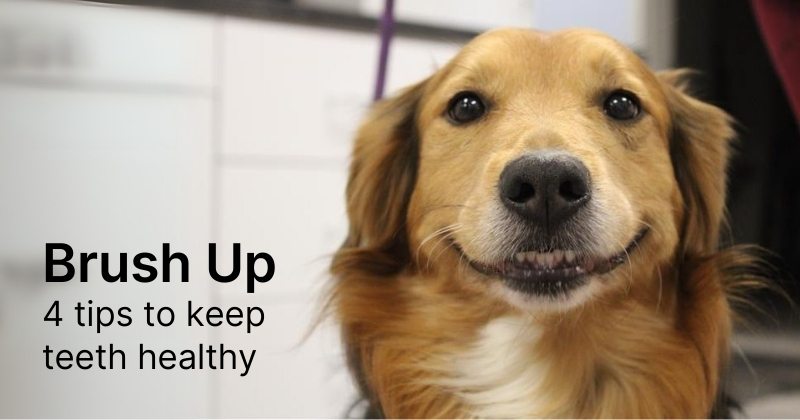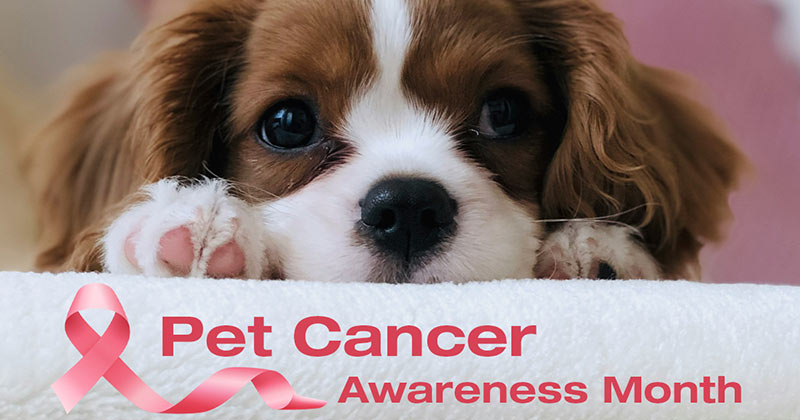
Your dog’s smile says a lot about their overall health, and when those teeth turn brown, it can leave you wondering what might be going on. While you may not expect your dog’s teeth to be gleaming white like human teeth, discoloration could indicate a variety of issues. Let’s explore some common reasons why your dog’s teeth might turn brown, what it means for their health, and when to consult your veterinarian at The Ridge Veterinary Clinic in Omaha, NE.
There are several reasons why your dog’s teeth might develop a brownish hue. Some causes are relatively harmless, while others could be signs of more serious health concerns.
When food particles, saliva, and bacteria accumulate on the surface of the teeth, they form a sticky film called plaque. If plaque isn’t removed, it hardens into tartar, which can turn the teeth brown. Tartar not only affects the appearance of your dog's teeth but can also lead to gum disease, tooth decay, and infections if left untreated. Regular brushing of your dog’s teeth can help reduce the buildup of plaque and tartar, but professional cleanings from your veterinarian may be needed to fully address the issue. If you notice that your dog's teeth are turning brown due to tartar buildup, scheduling a dental cleaning at The Ridge Veterinary Clinic is a smart next step.
When bacteria feed on food particles in the mouth, they produce acids that can erode the enamel and cause cavities. These cavities often appear as brown or black spots on your dog's teeth. Cavities may cause your dog pain, make chewing difficult, and lead to infections if not treated promptly. If you spot any signs of tooth decay, such as brown teeth, bad breath, or difficulty eating, it’s important to bring your dog in for a dental evaluation. Your veterinarian can assess the extent of the decay and recommend appropriate treatments, which may range from filling cavities to extracting severely damaged teeth.
Dental disease is a widespread issue among dogs, particularly as they age. A brownish tint on the teeth could indicate an underlying problem with your dog's oral health. Left unchecked, dental disease can progress and affect your dog’s quality of life.
Periodontal disease is an advanced form of gum disease that occurs when plaque and tartar are allowed to accumulate over time. As the bacteria infect the gums, they cause inflammation, receding gums, and damage to the structures that support the teeth. In severe cases, periodontal disease can cause tooth loss and even affect the bones in your dog’s jaw. Dogs with periodontal disease often have brown teeth due to the tartar buildup. Other symptoms include red or swollen gums, bad breath, and difficulty chewing. If you notice any of these signs in your dog, The Ridge Veterinary Clinic offers dental exams and treatments that can help manage and reverse the progression of periodontal disease.
This occurs when bacteria invade the root of a tooth, causing an infection. Abscesses are painful for dogs and can lead to swelling, facial tenderness, and a decrease in appetite. The infected tooth may appear discolored, turning brown or black. If you suspect your dog has a tooth root abscess, contact your veterinarian immediately. Treatment typically involves draining the abscess and addressing the infection, either by root canal therapy or tooth extraction.
What your dog eats plays a significant role in the condition of their teeth. A poor diet can contribute to plaque formation and overall oral health problems.
Certain foods, especially those high in carbohydrates, can stick to your dog’s teeth and contribute to plaque buildup. While dry kibble can help scrape away some plaque as your dog chews, wet food can leave more residue behind, leading to quicker tartar formation. Additionally, treats and human food that are high in sugar can accelerate the process of tooth decay. Incorporating dental chews or toys designed to help clean teeth can aid in reducing plaque and tartar. However, diet alone isn’t enough to keep your dog’s teeth clean. Regular dental care, including professional cleanings and at-home brushing, is essential to maintaining good oral hygiene and preventing brown teeth.
Choosing the right diet can help prevent brown teeth and support your dog’s overall dental health. Look for high-quality dog food that promotes dental hygiene and doesn’t contain excessive amounts of filler ingredients or sugar. You can also ask your veterinarian for advice on dental-specific diets that are formulated to reduce plaque and tartar buildup.
Preventing brown teeth in dogs is often a matter of staying proactive about their dental care. By following a few key steps, you can keep your dog’s teeth in better condition and avoid the complications associated with dental disease.
Use a dog-safe toothpaste and a toothbrush designed for pets, and aim to brush their teeth at least a few times a week. If your dog is resistant to brushing, start slowly and gradually increase the frequency. Be sure to reward them with positive reinforcement to make the experience less stressful.
Annual or bi-annual dental checkups allow your veterinarian to spot any developing problems before they become serious. During these exams, your vet will assess the state of your dog's teeth, gums, and overall oral health, and recommend cleanings or other treatments as needed.
If your dog’s teeth are already brown, be sure to address the issue before it leads to more severe dental problems. Brown teeth can be a sign of underlying conditions that require veterinary attention, such as dental disease, cavities, or infections. The Ridge Veterinary Clinic can help assess and treat your dog’s oral health needs.
If your dog’s teeth are brown and you’re noticing other symptoms like bad breath, difficulty eating, or gum inflammation, it’s time to schedule a dental checkup. Early intervention can prevent more serious issues and ensure your dog’s comfort and well-being. Call The Ridge Veterinary Clinic at (402) 334-1580 or request an appointment to have your dog's teeth evaluated. Our team is committed to helping your dog achieve optimal dental health.
Oral health plays a vital role in your dog’s overall well-being, and taking steps to address brown teeth can have a significant positive impact. Through professional cleanings, dietary adjustments, or regular at-home care, maintaining your dog’s dental hygiene is essential to their long-term health and happiness. Don’t wait until dental problems become severe—take action to keep your dog’s smile healthy today. Call The Ridge Veterinary Clinic at (402) 334-1580 or request an appointment online.
Closed daily from 12:30-1:30pm;
Thursdays Closed 12:30-2:00pm


